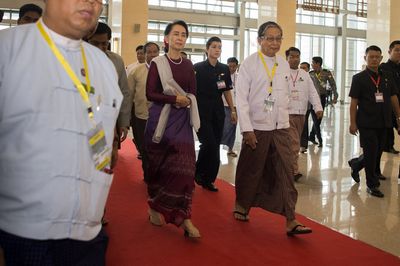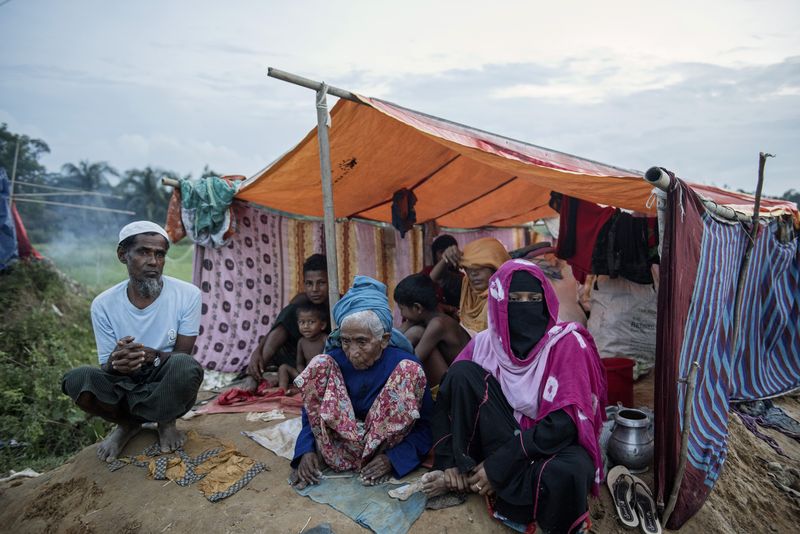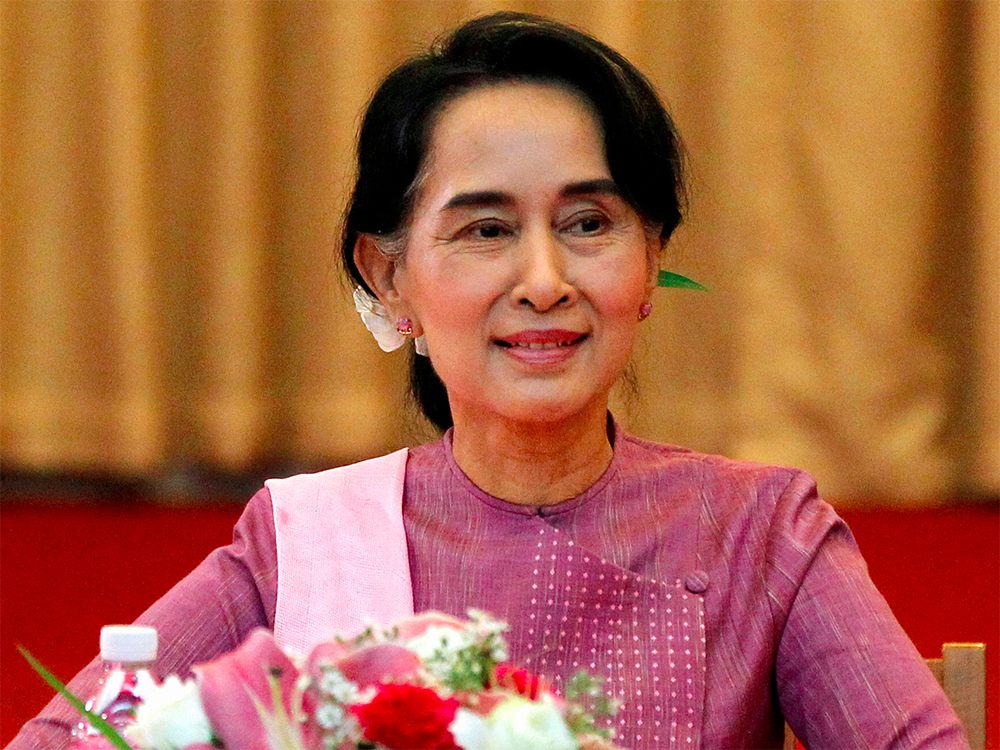Myanmar leader Aung San Suu Kyi said her government was ready to welcome back Rohingya refugees who fled a crackdown by security forces over the past month.
“We condemn all human rights violations and unlawful violence,” Suu Kyi said on Tuesday in a rare televised English-language address from the capital Naypyidaw. “We are committed to the restoration of peace, stability and rule of law throughout the state.”
More than 400,000 Rohingya refugees have fled across Myanmar’s border with Bangladesh since Aug. 25, when militants from the Arakan Rohingya Salvation Army attacked 25 police and army posts, killing a dozen security officials in the eastern state of Rakhine.

Photographer: Ye Aung Thu/AFP via Getty Images
The military responded to those attacks with what it has called “clearance operations.” Human-rights groups have accused security forces and Buddhist vigilantes of indiscriminately attacking Muslims and burning their villages.
“The security forces have been instructed to adhere strictly to the code of conduct in carrying out security operations, exercise all due restraint and to take full measures to avoid collateral damage and the harming of innocent civilians,” Suu Kyi said. Authorities are ready to start the verification process for those who fled to return to Myanmar, she said.
The army has said more than 400 people have died, most of them militants, while human-rights groups say hundreds of villagers have been killed. Earlier this year, United Nations investigators concluded that soldiers had “very likely” committed crimes against humanity while responding to a Rohingya militant operation in October 2016.
Expressing concern at the number of Muslim refugees fleeing across the border to Bangladesh, Suu Kyi pledged to find out “why the exodus is happening.”
“I think it is very little known that the great majority of Muslims in Rakhine state have not joined the exodus,” Suu Kyi said. “More than 50 percent of the villages of Muslims are intact.”
Suu Kyi’s references to the majority of Muslims in Rakhine state not having fled “seem completely irrelevant,” said Melissa Crouch, a senior lecturer in the Law Faculty at the University of New South Wales.

Photographer: Ismail Ferdous/Bloomberg
“Many of her blanket statements are unfortunately just not true,” said Crouch, whose publications include “Islam and the State in Myanmar,” referring to Suu Kyi’s statement on Tuesday that all people in Rakhine state have access to healthcare and education.
While the crisis has damaged Suu Kyi’s reputation abroad, it has boosted support for her at home. “What the international community is also misunderstanding is that they have now made a martyr of Daw Suu,” Crouch said. “The campaign ‘we stand with Daw Suu’ was all over Facebook leading up to and after the speech. She clearly still has the support of the majority of the people.”
Still, the crisis has threatened to sap investor confidence in the fast-growing Southeast Asian nation, which saw the U.S. and European nations begin to ease sanctions after the military junta released Suu Kyi from house arrest in 2010.
Foreign investment plunged 30 percent last fiscal year after overseas investors pumped a record $9.5 billion into the economy in the preceding 12 months. The investment shortfall coincided with concern over the direction of the government’s economic agenda and increased attention over Rakhine.
Myanmar still has a bright economic outlook as it builds off a low base. The Asian Development Bank forecasts growth at 7.7 percent for 2017 and 8.0 percent in 2018.
Concern about Rohingya refugee
On the sidelines of the U.N. General Assembly in New York on Monday, diplomats from the United States, Britain and other countries concerned about the humanitarian crisis in Rakhine called for an end to the violence and for measures to relieve Rohingya refugees’ suffering. U.S. Ambassador Nikki Haley said it was a “productive meeting about the dire situation,” but that no improvement has been seen on the ground in the area where displaced Rohingyas have been fleeing into Bangladesh.
“We continue to hear reports of violence and suffering,” Haley said afterward. “People are still at risk of being attacked or killed, humanitarian aid is not reaching the people who need it, and innocent civilians are still fleeing across the border to Bangladesh.”
British Foreign Secretary Boris Johnson convened the meeting with Haley, Burma’s national security adviser and deputy foreign minister, and other senior officials. Ministers from Bangladesh, Indonesia, Turkey, Australia, Canada, Sweden and Denmark attended the private meeting.
Aid agencies want full access
In addition to their call for an end to violence and full, unimpeded access for humanitarian workers from the U.N. and other agencies, Boris Johnson said the ministerial group felt that “while Burma has undoubtedly made encouraging progress toward democracy in the last few years, the situation in Rakhine, the terrible human-rights abuses and violence are a stain on the country’s reputation.”
“As I have repeatedly said, no one wants to see a return to military rule, so it is vital that Aung San Suu Kyi and the civilian government make clear these abuses must stop,” he added. Johnson said he was encouraged by the discussion and participation of the senior Burmese officials.
“The international community is committed to seeking a solution that ends this crisis and brings peace and stability to Rakhine State and the rest of Burma,” the U.S. ambassador said in a statement. “The United States continues to urge the Burmese government to end military operations, grant humanitarian access, and commit to aiding the safe return of civilians back to their homes.”
Monday’s high-level meeting was “a first step, but it can’t be the last,” said Louis Charbonneau, the U.N. director at Human Rights Watch. “This discussion should lead to strong U.N. action to compel Myanmar security services to end their ethnic cleansing campaign.”
Charbonneau urged the General Assembly to draft a resolution condemning the abuses and called on the Security Council to impose targeted sanctions and an arms embargo on the commanders leading the military crackdown.

